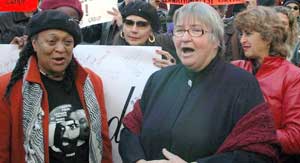Lynne Stewart sentencing
‘A victory for the movement’
By
Monica Moorehead
New York
Published Oct 19, 2006 1:43 AM
A political victory was won on
Oct. 16 when long-time civil rights attorney Lynne Stewart was given a 28-month
prison sentence by a Manhattan federal judge. The Bush administration, through
its prosecutors, had been pushing for the maximum sentence of 30 years in
prison.
|
Lynne Stewart, right, at rally before receiving judge’s
decision on Oct. 16.
She is joined by Pam Africa, left,
leader of the International Concerned Family
and
Friends of Mumia Abu-Jamal.
Photo: Roberto Mercado
|
Hundreds of Stewart’s
political supporters from around the country gathered outside the New York City
courtroom before and during the sentencing, demanding that she not be given any
prison time at all, especially after her recent struggle with breast cancer.
Holding up signs and banners, they chanted, “Free Lynne, Free
Lynne!” as she went into the courtroom.
U.S. District Judge John G. Koeltl, who
presided over the proceedings, told Stewart that she would be allowed to stay
out of prison while she appeals her conviction. The appeals process could take
at least a year, if not more. In the meantime, she has been barred from
practicing law.
Thousands of letters
supporting Stewart were reportedly sent to the judge before the sentencing.
Stewart was found guilty on Feb. 10,
2005, of helping a former client, Omar Abdel-Rahman—a blind Egyptian
Islamic cleric sentenced to life for plotting to blow up New York City
landmarks—to communicate with his followers on the outside. Abdel-Rahman
had been labeled a “terrorist” under the repressive U.S. Patriot
Act, which was passed following the 9/11 attacks on the World Trade Center in
2001.
This racist legislation has
legally sanctioned the outright political persecution of thousands of Arabs and
South Asians by the U.S. government, resulting in long periods of jail time
without charges and trials as well as massive deportations.
Stewart’s co-defendant, Ahmed
Abdel Sattar, formerly a postal worker in Staten Island, received a 24-year
prison sentence. Mohamed Yousry, an Arabic translator Stewart depended on for
translating between herself and Abdel-Rahman, was sentenced to 20 months in
prison.
When Stewart was first arrested
in 2002, it was John Ashcroft, the notorious former U.S. attorney general, who
publicly read the charges against her. Her arrest was meant to send a clear
message to all progressive lawyers not to energetically represent any Arab,
South Asian or Muslim whom this government painted as a “threat” to
the national security of the U.S.
Many
activists are convinced, and understandably so, that the U.S. government wanted
to make an example of Stewart because of her consistent, and in many cases
successful, legal defense of poor and oppressed peoples for the past 30 years.
She had represented, among other
people, David Gilbert of the Weather Underground; Richard Williams of the United
Freedom Front; Larry Davis, acquitted by reason of self-defense of the attempted
murder of New York City police officers; Sekou Odinga of the Black Liberation
Army; and Nasser Ahmed, released after being imprisoned for over three years on
non-existent “secret
evidence.”
Before her sentencing,
a number of solidarity meetings were held for Stewart in New York. These
included an Oct. 12 cultural event at Solidarity Center sponsored by the
International Action Center; an event in Harlem on Oct. 13 that included an
array of speakers representing the Black and Latin@ movements, and a meeting at
Riverside Church on Oct. 15. Stewart attended every one of these events, where
many of the African American speakers compared her to the historic anti-slavery
fighter John Brown.
In response to her
sentencing, Stewart stated that it was “a victory for doing good work all
one’s life. You get time off for good behavior usually at the end of your
prison term. I got it at the beginning.” Stewart also said she hoped to
once again be able to work in court on behalf of defendants, as she had done for
30 years.
Articles copyright 1995-2012 Workers World.
Verbatim copying and distribution of this entire article is permitted in any medium without royalty provided this notice is preserved.
Workers World, 55 W. 17 St., NY, NY 10011
Email:
[email protected]
Subscribe
[email protected]
Support independent news
DONATE


